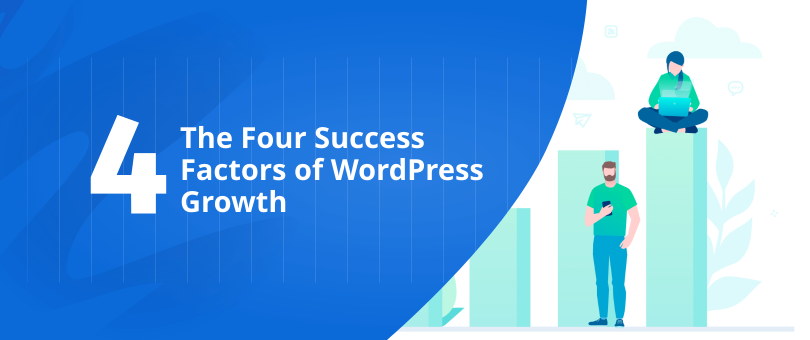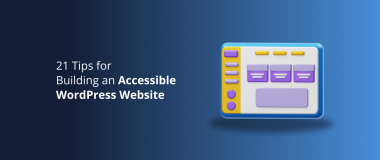WordPress is a huge success and its market share is growing. It is not news that it is the most used content management system, running over one-third of the web content worldwide, from millions of personal blogs to highly complex businesses and publishing platforms.
However, not everybody knows that WP is open source software which means its code is visible and available to use and modify, and is owned by nobody. No single company is exclusively developing and maintaining the WordPress CMS. Instead, hundreds of (almost) anonymous and motivated professionals contribute for free and are jointly responsible for how it functions.
How is that not only possible but very successful? There is no free lunch, they say, and software has to be developed, constantly maintained and improved. Also, to keep up the motivation of large volunteering communities is really a serious endeavor.
So WordPress must be doing something right? Many take WordPress for granted and do not even know how amazing its operational model is, how magnificently it has grown as a brand and what an inspiring global community it connects. This is what we want to tell you about: how the WordPress giant works.
What WordPress Stands for
When speaking about WordPress, 99% of the times it is the CMS that they are referring to, not the trademark nor the company (since there is no private company with the name).
WordPress is a content management system (CMS) or software that helps manage what is published on the web. That’s why most people learn about WP when they want to start their own website. It is quite common to start a hosted blog at WordPress.com then become more confident and download the CMS from WordPress.org to host it somewhere and build the website of your dreams.
WordPress.Com and WordPress.Org
There is often some confusion between the two WP domains: .com and .org, and how they are used and what they offer.
WordPress.com is a free service for creating hosted blogs. As of today, WordPress.com is owned by Automattic, a privately held company, which started the whole brand. The blogs there are run by a light version of the WordPress CMS and every user is obliged to adhere to the platform’s terms and regulations as the service may be terminated when breaching them. A major limitation is that privately developed themes and plugins cannot be added and the whole blogosphere functions as one of the greatest multisite network ever.
The other platform, WordPress.org, is a community for the complete version WordPress CMS, where people work on it as open source software. It’s also the place where the software can be downloaded to create websites of any kind and hosted on any web server.
Success Factor No. 1: the Same CMS on Both .Com and .Org Platforms
Businesswise, this is a major factor in the WordPress success: to use one and the same CMS to build a free blogosphere on WordPress.com and to create a community of volunteers on WordPress.org to develop, upgrade and use the CMS.
Both platforms cover a whole specter of target groups: from beginners to advanced users, private individuals and large enterprises, amateur content producers and professional publishers.
This way, a very smooth learning curve has been created to engage millions of users. One of the most common WordPress paths is to start as a blogger on .com and later join .org as a developer, designer, content marketer to work on privately built and hosted WP platforms.
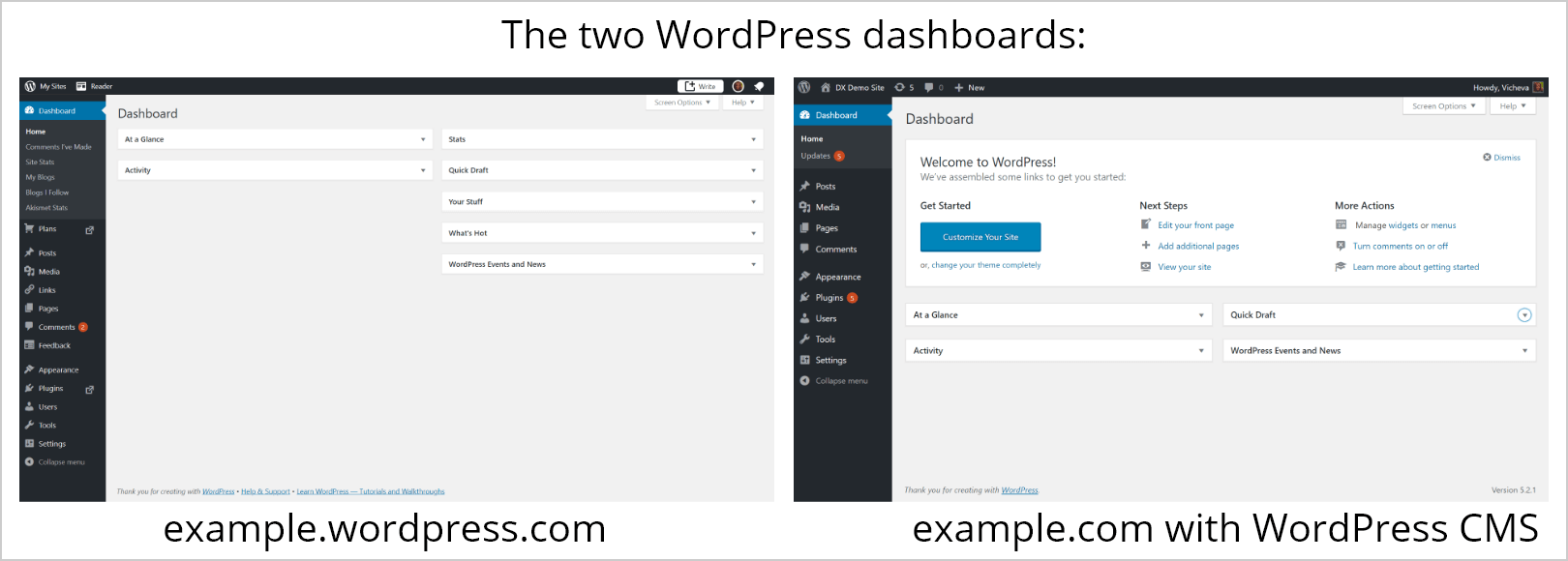
The two dashboards of a blog on WordPress.com and a website, run with WordPress CMS, are practically the same.
Success Factor No. 2: WordPress Is Open-Source, Fueled by Contribution
Licensing software as open source is neither new nor uncommon in software development. It is rather a fundamental choice when starting a software project – make it open for everyone to use and update, or keep it private and sell it with a license.
But with WP it is not just choosing the altruist way. What we have is a global phenomenon that very cleverly combines volunteer work with commercial interests. Plus it is scaled to reach both individual users and publishers with millions of impressions.
What open source means is that anyone can see the software code and use it. It is important to know that WordPress CMS is licensed under the Generic Public License (GPL) which offers the following benefits to users and businesses:
- They can use WordPress in any way they choose without restraints.
- They can alter, customize, remove and add code to WordPress, also without any restrictions.
- And finally, they can rename, rebrand, resell and distribute WordPress as long as their product is also released under the Generic Public License (GPL).
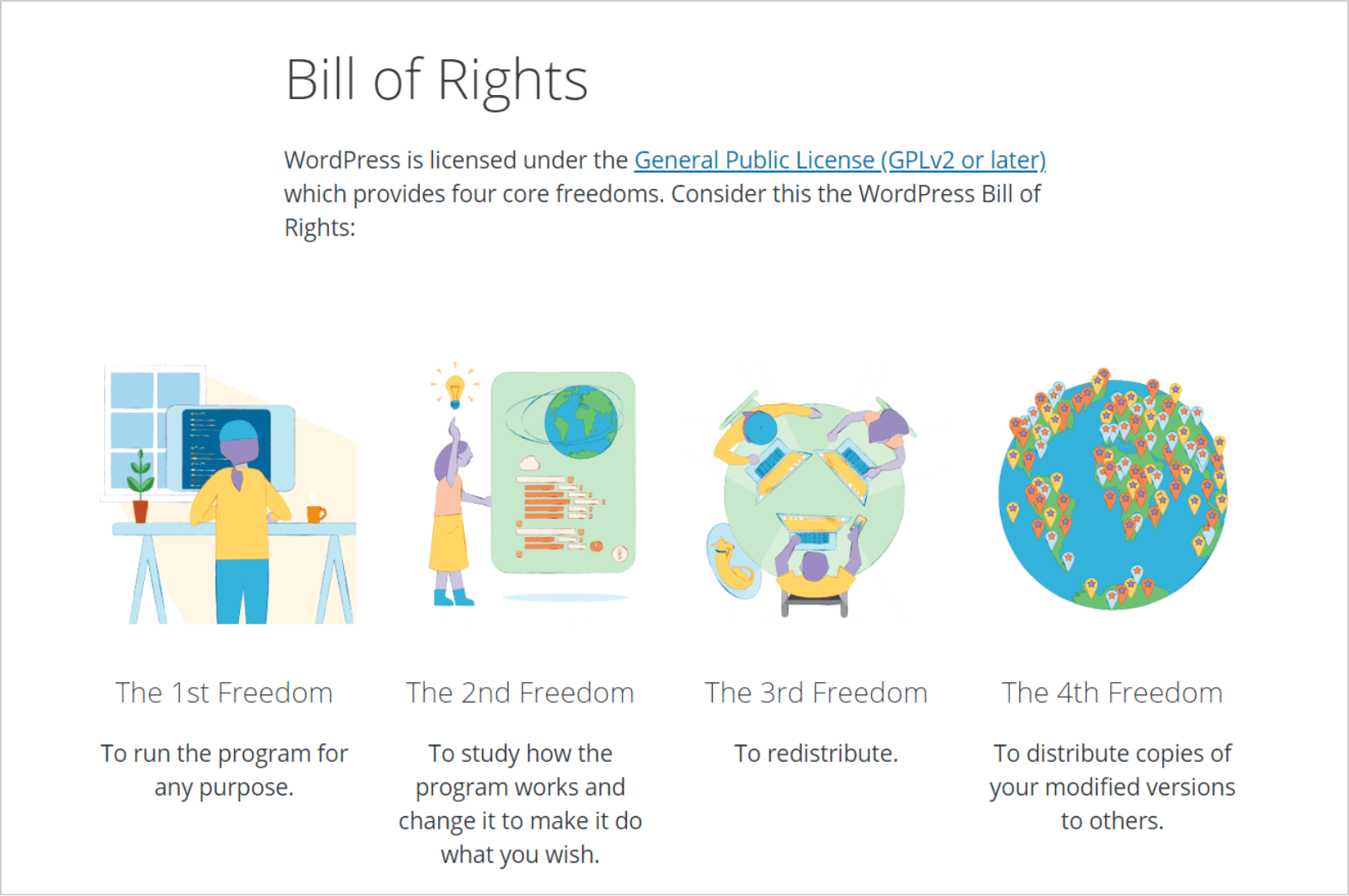
Bill of Rights on WordPress.org
The result is that millions-worth of online businesses are being built upon WordPress CMS. Licensed as open source and easily available, creates a win-win situation where individuals and businesses are motivated to improve WordPress and contribute to its development.
This way every company and individual using WP for their projects, needs it to be working perfectly, safe and constantly being improved so that their own businesses prosper.
Success Factor No. 3: Build WordPress-Related Businesses
The whole idea behind giving the WordPress CMS to the community was to help them build businesses on top of a free service. But building WordPress-managed websites and online platforms is not the only way to make money from it.
For example, WordPress CMS is open to custom plug-ins and themes that can be integrated into the core. That means every development company can design and develop an unlimited number and type of plug-ins and themes compatible with the CMS and that would be included in the WP repository.
There are numerous ways to make money with WordPress and it is possible to create real empires from related businesses. Automattic itself is the perfect example. Besides owning WordPress.com, its generic business model is to sell WordPress-related services such as hosting, backup solutions, spam protection, web statistics, and others, so that starting a WP site, website owners and bloggers don’t think about searching for other services providers. WooCommerce – the e-commerce plugin of WP – is also in their portfolio and the company supports projects like BuddyPress (WP social media platform).
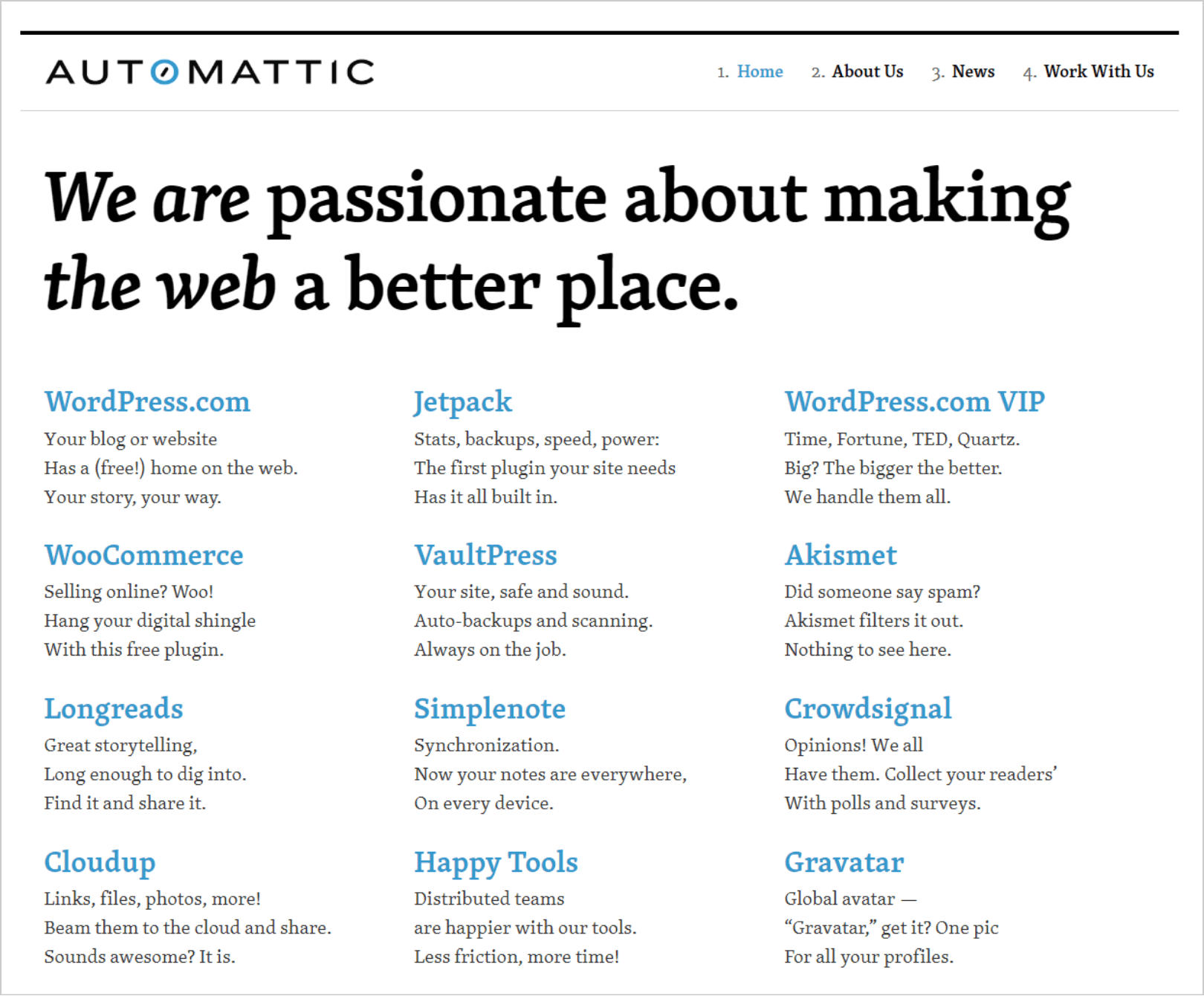
Automattic does not own WordPress CMS but has built its business portfolio on services related to WordPress use
Success Factor No. 4: Inspiring Brand Image & Creative Communication
Ideas and inspiration usually come first. Here we add them last – because this is what WordPress is also about: spreading the good vibes and passing on positive ideas.
WordPress core philosophy is very inspiring – based on the win-win model of receiving a great service for free and giving back as a contribution, having open and transparent community practices, and combining online communication with vivid offline events.
Last, but not least, the sustainable WordPress model is creatively packaged with inspiring headlines and brand messages that all WordPress enthusiasts adore. Here are some of them:
WordPress.org
“Code is Poetry” – this is the inspirational WordPress slogan. It is really a stroke of genius: short and simple. It highlights the ultimate insight for WordPress designers and developers: they love to create.

Looking at Automattic’s home page, it is obvious that WordPress comes from the same creative family:
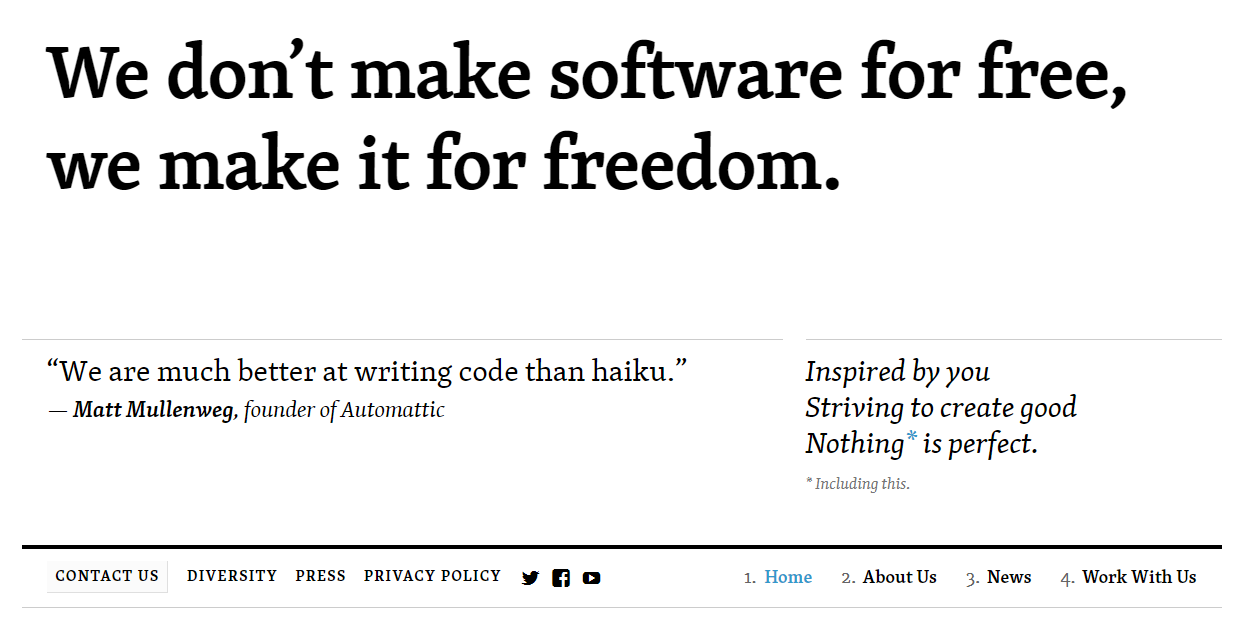
Here are some more WordPress pages that have inspirational messages:
WordPress.org About Page
Democratize Publishing

WordPress.com
Build a website, build a movement

WordPress.com Log-in
Be ready whenever, wherever inspiration strikes
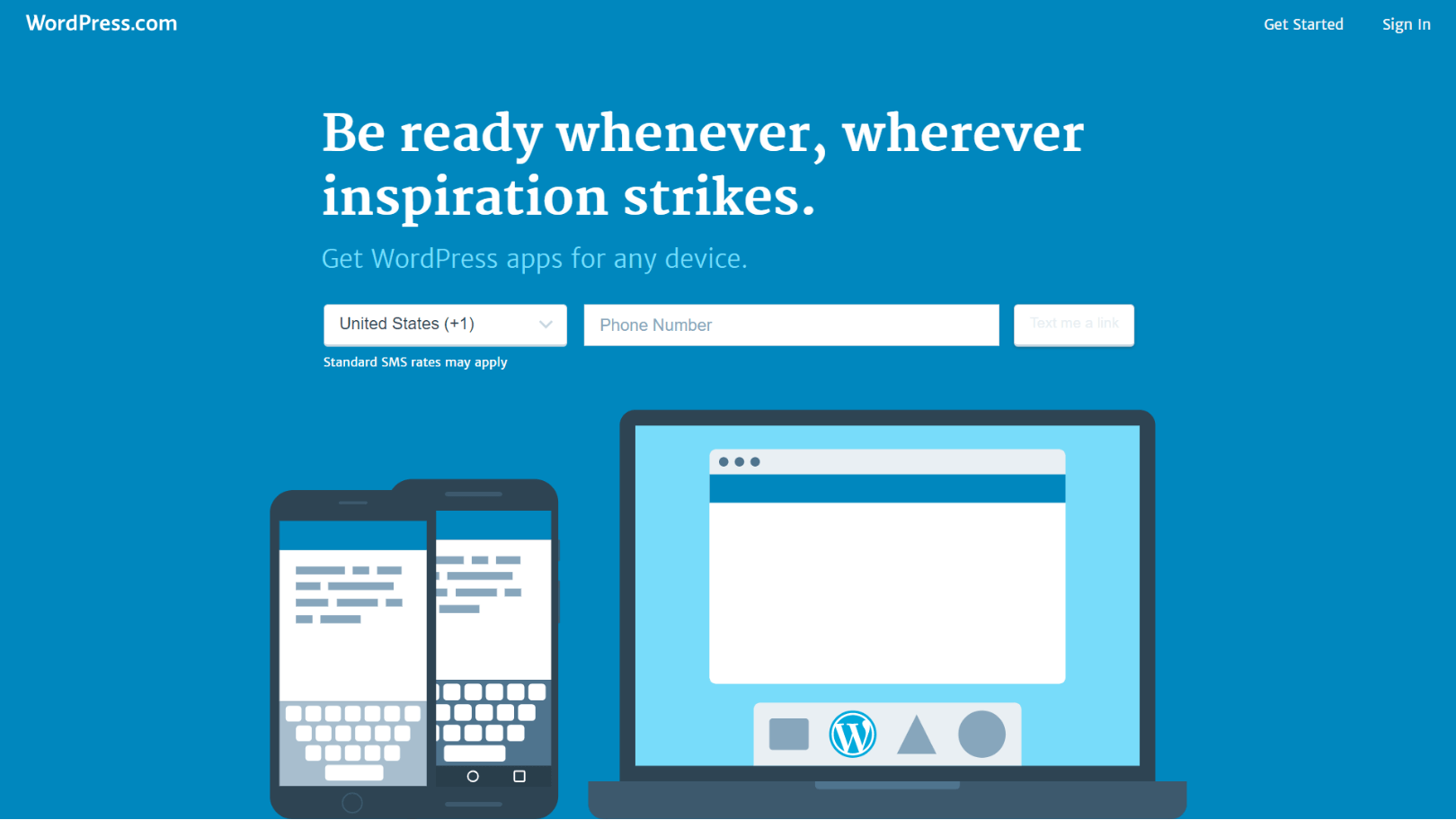
Millions of people worldwide relate to these messages. Really poetic and inspiring, right?
Some WordPress-Related FAQ
Here are some FAQs related to how the WordPress platform is operated and used.
Is it a good idea to start from .com and later migrate to .org?
Furthermore, as your business grows, you may transfer your content from a .com blog to an .org website as it’s technically possible to import content and it’s done in seconds. Posts, pages and media could be imported between both platforms. But this is not applicable for design and functions – the .com option is stripped of the ability to add external themes and plugins, it comes with a pre-selected choice covering very basic features. Yet starting with a WordPress.com site is very practical for beginners who want to learn how the WP CMS generally works and how to update content with it.
Who owns WordPress?
The WordPress foundation was created and works to ensure that WordPress CMS is freely available, maintained, and developed. It owns the WordPress.org domain plus in 2010 Automattic donated the WordPress trademark to the foundation to support the long-term sustainable development of the non-profit WP project. WordPress foundation’s primary source of revenue is through donations.
As far as ownership and trademark rights go, Automattic has the ability to use the WordPress trademark and to operate the precious WordPress.com domain which is part of their blogging and hosting product.
50,000 #WordPress.com websites are being launched daily
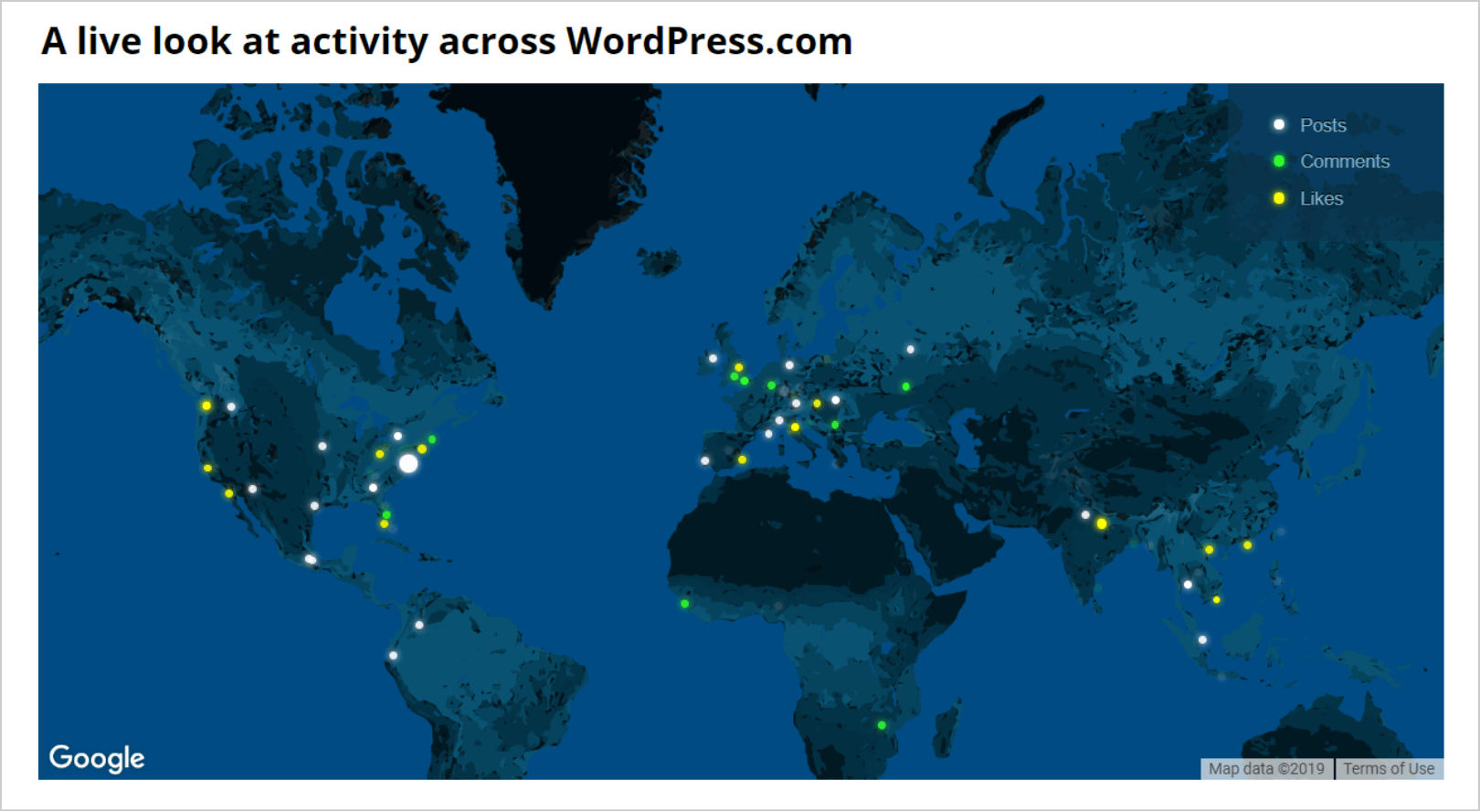
Source: https://wordpress.com/activity/
How Much Does WordPress Cost?
Yes, WordPress is free for everyone, but it does take significant time and money to build and maintain it. An exact price could not be calculated but it is possible to estimate an opportunity cost of how much time and money has been invested into WordPress so far.
According to the Open Hub’s Project Cost Calculator and its data from September 2018, the estimated cost of building WordPress was USD 8,282,611
– which includes 560,703 lines of code
– would take 151 personal years to develop
– with an average annual salary of $ 55,000
How to Contribute to WordPress
Officially, there are 18 ways to contribute to WordPress. Once you get involved with the community, more and more opportunities emerge.
DevriX’s team have been contributing to WordPress development and community events since the day the agency was established. We are proud to be part of this inspiring global project, to have written hundreds of core code lines, created and translated numerous themes and plugins, sponsored most of the events in our area, shared knowledge and know-how in WordCamp talks and Contributor days, and so on.
